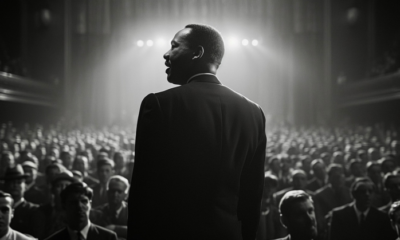Success Advice
How to Influence Yourself for Success: The Ultimate Internal Competition
Top performers in any field say that the ultimate competition is not with others, but within ourselves

Conventional wisdom emphasizes that we compete with others. We compete with other companies in the marketplace whom we must beat in order to win and succeed. Top performers in any field, though, all say that the ultimate competition is not with others, but within ourselves.
How do we keep calm when our competitors play dirty? We have to master our own reactions to prevail. Further, how do we give a long-standing direct report some very tough feedback that they will feel hurt by, but if they don’t correct it could get them fired? The positive influence (+influence) warrior must master these moments of inner turmoil.
In the journey to maximize +influence, we must win three competitions with ourselves:
– First is a competition between our persona (who we think we should be) and who we truly are — the imperfect but amazing being with all the basic human qualities, like courage, care, and compassion.
– Second is the competition between fear and love. Both are powerful emotions within us, vying for expression but ultimately stronger together.
– Third is between hope and giving up. Do we keep trying or give into that sense of tiredness from life’s inevitable trials and tribulations?
Nobody sets out to be a fake person, but often we let our desire to either please or prevent discomfort for others prevent us from providing the reality check that’s necessary for positive movement. Tough performance feedback is a common example.
We want to be caring, constructive managers and leaders. We worry whether we’re being too tough or whether we have enough evidence to support our intuition and messages. We hesitate to act on potentially serious issues, thinking that maybe allowing enough time might do it, or somebody else might step in, or the person might realize it himself or herself.
This well-intended but oftentimes wishful thinking leads to a missed opportunity to help the person take stock of the reality of where they are and challenge and support them on how to change and grow.
How could we win the competition within ourselves to not give in to our worst instincts and to successfully access our better human qualities?
In doing so, these are the qualities we need to cultivate:
1. Caring
There is a big difference between caring with a small c and Caring with a big C. With a small c, caring refers to having a concern for other people’s feelings in the moment, not wanting to hurt them, and not wanting them to experience negative emotions. This is human.
We all abhor and avoid negative emotions. Caring with a big C considers the person’s productivity, satisfaction, and growth, now and for the foreseeable future — way beyond how they may feel in the moment and how they feel about you as the messenger.
In moments of turmoil, ask yourself: What will really help this person be successful and satisfied in achieving the things that are important to them? What action, words, and thoughts from me could serve that noble purpose?
“Knowing others is intelligence; knowing yourself is true wisdom. Mastering others is strength; mastering yourself is true power.” – Laozi
2. Courage
Courage also comes in small c and big C versions. Big C Courage is making the choice to do something that you fear, whereas small c courage is bearing the tough conversation and the negative emotions. Many +influence attempts aren’t made due to fear of losing a relationship, offending, or getting it wrong. Yet often, not acting is very costly as well.
In moments of turmoil, ask yourself: What are the fears and concerns inhibiting me from thinking, feeling, and doing what’s needed to serve the other person’s (and overall) productivity, satisfaction, and growth? Are they rational or emotional? Rational fears are responsive to analysis and questioning. Ideally, confiding in another person can keep you honest.
Emotional fears require you to reflect more deeply about what’s really important.
3. Compassion
Some of the toughest moments for positive influence are when we’ve done ourselves wrong or others have done us wrong. Compassion plays a very central role in not getting lost in the intense emotions that try to take over.
In these moments of turmoil, ask yourself: What could still be positive outcomes for others, myself, and the larger whole?
Just when we want to judge, we want to lash out or just hide somewhere. Finding compassion (and humility) to acknowledge that it could very well be ourselves or anyone, really, who could have done these wrongs serves as an important reminder of the universality of human frailty, and also the opposite — the human strength to affect a different outcome.
That sense of possibility that something can be different is the flickering light that can illuminate a whole dark cave. But first we must keep the candle in our heart burning brightly.
Business
The Simple Security Stack Every Online Business Needs
Most small businesses are exposed online without realising it. This simple protection stack keeps costs low and risks lower.

Running a business online brings speed and reach, but it also brings risk. Data moves fast. Payments travel across borders. Teams log in from homes, cafés, and airports. (more…)
Business
If Your Business Internet Keeps Letting You Down, Read This
From smoother operations to better security, dedicated internet access is quietly powering today’s high-performing businesses.

Today, a dependable internet service is the bedrock for uninterrupted business operations. Many organizations rely on stable online connections for communication, data transfer, and customer interaction. (more…)
Did You Know
How Skilled Migrants Are Building Successful Careers After Moving Countries
Behind every successful skilled migrant career is a mix of resilience, strategy, and navigating systems built for locals.

Moving to a new country for work is exciting, but it can also be unnerving. Skilled migrants leave behind familiar systems, networks, and support to pursue better job opportunities and a better future for their families. (more…)
-

 News2 weeks ago
News2 weeks agoBrandon Willington Builds 7-Figure Business by Ignoring Almost Everything
-

 Health & Fitness3 weeks ago
Health & Fitness3 weeks agoWhat Minimalism Actually Means for Your Wellness Choices
-

 Did You Know2 weeks ago
Did You Know2 weeks agoWhy Most Online Courses Fail and How to Fix Them
-

 Business2 weeks ago
Business2 weeks agoIf Your Business Internet Keeps Letting You Down, Read This
-

 Business7 days ago
Business7 days agoEntrepreneur’s Guide to Pay Stubs: Why Freelancers and Small Business Owners Need a Smart Generator
-

 Business5 days ago
Business5 days agoThe Simple Security Stack Every Online Business Needs
-

 Scale Your Business5 days ago
Scale Your Business5 days ago5 Real Ways to Grow Your User Base Fast
-

 Business4 days ago
Business4 days agoThe Salary Shift Giving UK Employers An Unexpected Edge



























